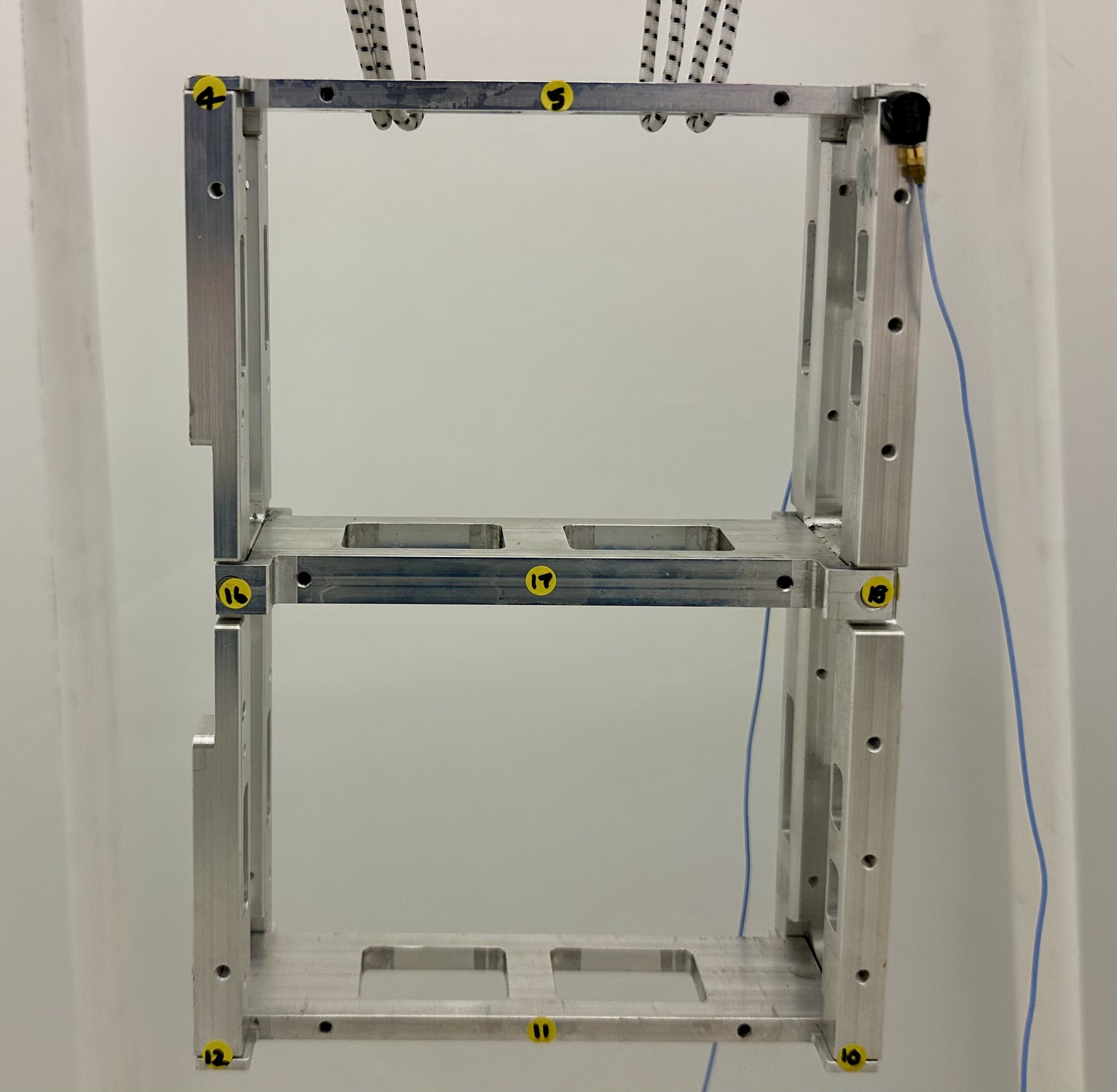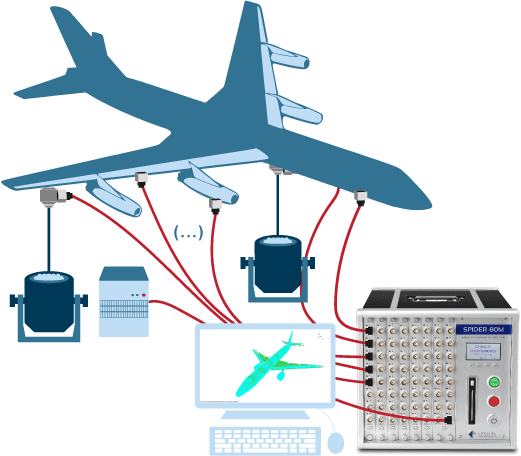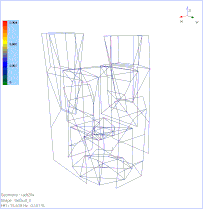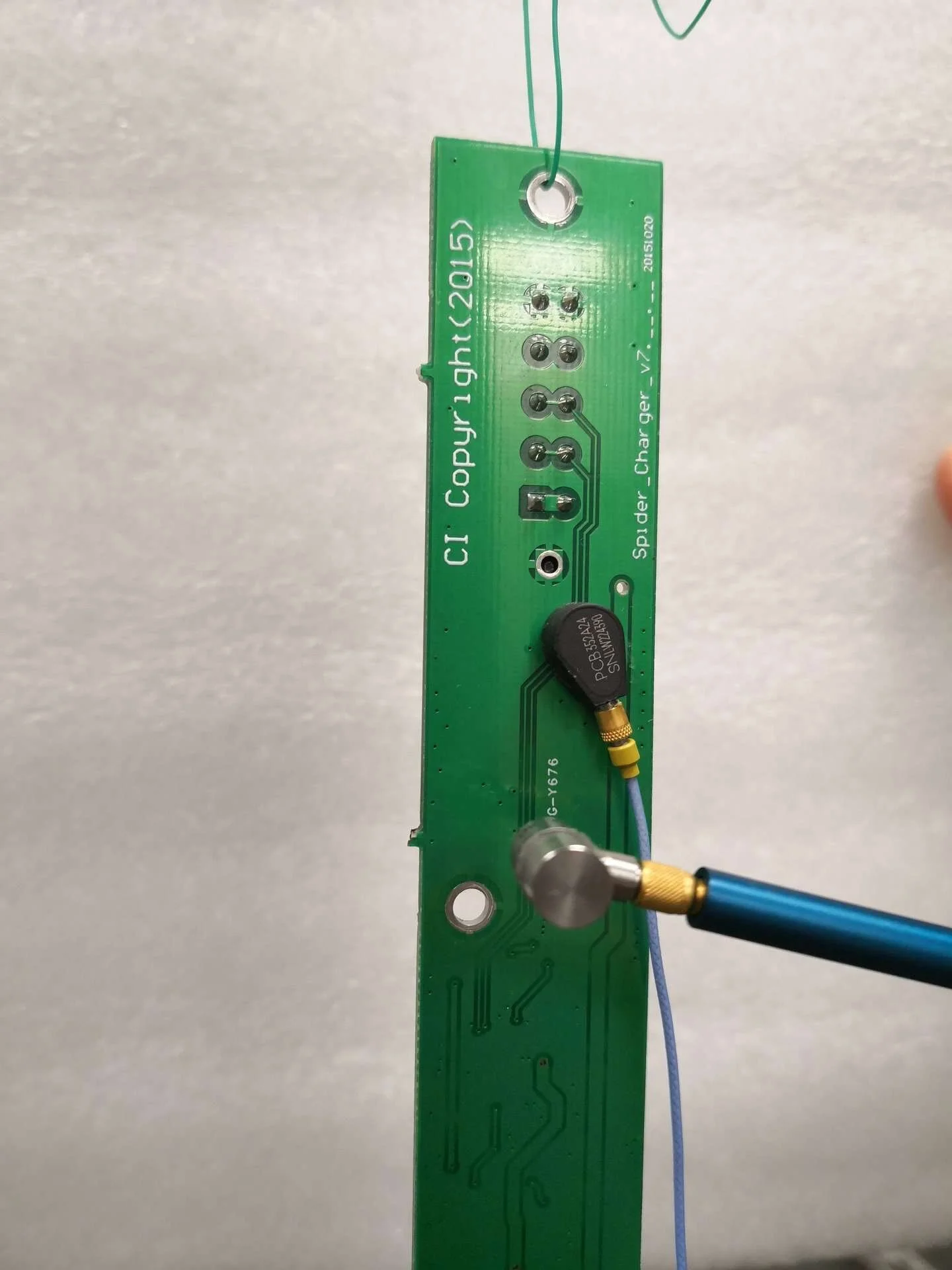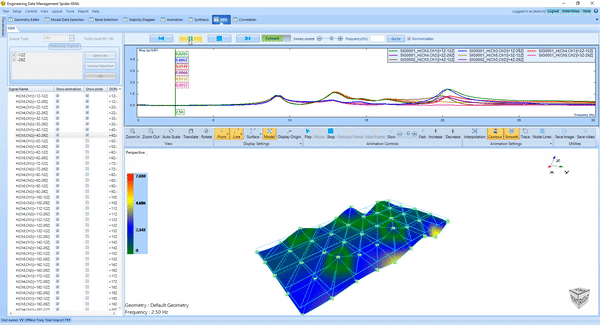The case described in this article examines the modal characteristics of a satellite model acquired from performing experimental modal analysis. A hammer impact test was carried out with two teardrop uni-axial accelerometers (mounted in different directions) to study the modal behavior. The roving excitation method assists in completely avoiding the potential mass loading side effect produced by a roving response procedure. A hard tip was selected to excite the higher frequency modes.
Read MoreA violin was suspended on a frame to a imitate free-free boundary condition. Sentek Dynamics’ BT-100M shaker was used to excite a violin at the base of its front panel. Polytec’s PSV500 laser scanner was used to measure and acquire the data from the back panel of the violin. Crystal Instrument’s EDM Modal software processed and analyzed the dataset to provide the modal parameters of the violin.
Read MoreGround Vibration Testing (GVT) includes the modal analysis of an aircraft and its sub-assembly components to analyze and detect any changes to their structural properties.
Read MoreCrystal Instruments CoCo-80X handheld dynamic signal analyzer allows users to acquire measurements with unparalleled convenience in the field. The rugged design features a compact display for quick, easy, and accurate data recording and analysis. This powerful hardware system is now combined with Crystal Instruments patented GPS time synchronization technology, featuring a time accuracy of 100 ns. Users can now execute Operational Modal Analysis to study the dynamic characteristics of large structures such as bridges and buildings.
Read MoreThe rugged and intuitive CoCo-80X handheld system is now combined with Crystal Instruments’ patented GPS time synchronization technology (featuring a time accuracy of 100 ns) to further expand field measurement capabilities. Users are now able to execute Operational Modal Analysis using the handheld CoCo-80X to study the dynamic characteristics of large structures such as bridges and buildings.
Read MoreThe Canadian Space Agency recently performed the Modal Analysis of a RADARSAT Satellite using five modal shakers. It is important to obtain the modal analysis of the unit-under-test because information about the natural frequencies, damping coefficients and mode shapes can be used to optimize its design and improve its structural behavior. The modal parameters about the mechanical properties of a structure help users understand its vibration characteristics during operating conditions.
Read MoreImplementing MQTT in EDM allows users to remotely monitor and operate environmental tests (vibration, temperature, humidity) and take measurements using EDM DSA.
Read MoreThe latest Experimental Modal Analysis Seminar was held from November 8-9, 2022 in Vancouver, British Columbia. Crystal Instruments partnered with Dalimar Instruments to present these modal training seminars in Canada. During the seminar, Dr. Peter Avitabile covered the basics of modal measurements, impact hammer tests, and shaker tests. The modal training seminar participants learned the theory behind techniques, performed measurements, and received hands-on training experience.
Read MoreDalimar Instruments and Crystal Instruments recently hosted an Experimental Modal Measurement and Analysis Seminar with Dr. Peter Avitabile from September 19th to September 20th in Montreal, Quebec. This joint seminar was held at Château Vaudreuil, an excellent facility with convenient amenities.
Read MoreThe rugged and portable CoCo hardware allows users to perform convenient measurement recordings and analysis in the field. Field operations are extended with the integration of EDM Modal software to provide a seamless modal analysis procedure.
Read MoreWritten in collaboration between PCB Piezotronics, Inc., Crystal Instruments, and Team Icewave
Icewave has an overall record of seven wins and six losses. Marc DeVidts, Icewave creator and team lead, believes some of the losses may have been due to the blade not impacting opponents effectively. Because of the power behind Icewave, some of these losses can be attributed to self-inflicted damage from its own rotating horizontal blade. The modal testing will be used to help increase striking effectiveness.
Read MoreThe experimental object in this modal test is a hood cross-flow fan with an overall structure that includes a roulette wheel, rotor frame and cross-flow blades that are composed of metal materials. The fan is hung using bungee cords to imitate free-free boundary conditions.
Read MoreIn this case, the modal characteristics of a Printed Circuit Board (PCB) is acquired by performing experimental modal analysis. A hammer impact test is carried out with a single teardrop uni-axial accelerometer to study the modal behavior. The roving excitation method helps users completely avoid the mass loading effect that might be introduced with a roving response procedure. Since the PCB is lightweight, the selected hammer and sensor were chosen because they weigh considerably lesser than the board itself. To excite the higher frequency modes, a hard tip is chosen. The hammer impact test module of the EDM Modal suite assists in executing this test.
Read MoreOperating Deflection Shape (ODS) Analysis helps users understand the dynamics of the unit under test by animating the test structure’s vibration. As the term suggests, the structure’s deformation during operating conditions is visualized. This aids in understanding the forced response of the test unit.
Read MoreModal testing and analysis are important processes that improve the design of a product. Therefore, it is crucial to ensure testing is carried out with optimal settings. The Shaped Random and Burst Shaped Random output excitation introduced by Crystal Instruments provides unique advantages such as a better estimation of the quality factor, damping and FRF amplitude. This indicates that the obtained modal parameters are more accurate. A modal test is carried out to examine the data to see the improvement in the results with these newly introduced techniques when compared to the conventional shaker excitation signals. The green curve shows the FRF obtained using the Shaped Random excitation and the blue curve shows the FRF obtained using the white noise excitation. As illustrated, the advantages of shaped peaks using the newly introduced approach leads to more accurate estimations of the quality factor, damping and FRF amplitude as discussed in the forthcoming sections.
Read More
